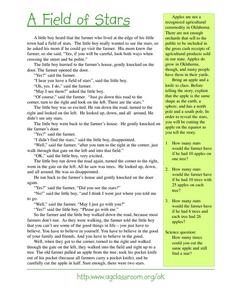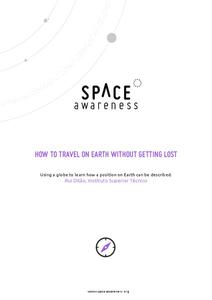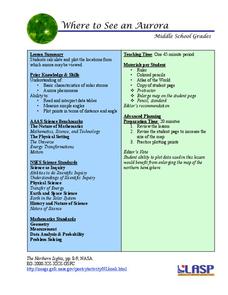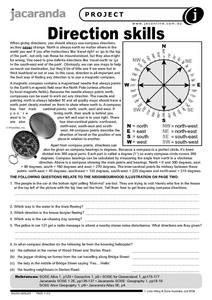Curated OER
Do Some Research: Earth
In this universe research worksheet, students read the sentence and use a library or the Internet to find the answer and write it on the blue line. Students must then write a report about this topic: the ____ regions are the area around...
Curated OER
Grant Proposal
Students experience the creativity, anticipation and peer review of obtaining a grant for scientific research at the poles. They work in cooperative groups to assess the dynamics of polar regions. Each student proposes an original...
Curated OER
Polar Expeditions
Students consider the implication of polar exploration. In this polar exploration activity, students research the expeditions that Admiral Peary, Dr. Cook, Captain Scott, and Roald Amundsen made to the North and South Poles. Students...
Curated OER
A Field of Stars
Students discover the earth can be compared to the shape of an apple, having a spherical shape, and has a north and south pole. They listen to the story, "A Field of Stars" and then observe as the apple is cut open on the equator to...
Mr. E. Science
Magnetism and Electromagnetism
The biggest magnet in the world is at the Los Alamos National Laboratory in New Mexico and can reach 100 tesla. By comparison, magnets that lift cars are about two tesla. The 11th presentation in this series covers magnetism, focusing on...
Curated OER
Magnetic Earth
In this magnetic Earth worksheet, students learn how a compass works with the magnetic poles of the Earth. This worksheet has 4 short answer questions.
Curated OER
Rotation Around the Sun
Third graders participate in a hands-on demonstration of the rotation of the earth around the sun. They identify the equator and the North and South Poles on a Styrofoam ball and then spin the ball on a pencil while they also revolve...
Curated OER
Magnetism
Student participate in magnetism demonstrations. In this magnetism instructional activity, students dangle paper clips near magnets and explain what happens. They work with steel wool, metal filings, and aluminum foil to see which items...
Space Awareness
How To Travel On Earth Without Getting Lost
Have you ever wanted to travel the world? Take a virtual trip with a geography lesson plan that uses longitude and latitude, the position of the sun, an astronomy app, and a classroom globe.
Curated OER
Equator, North Pole, and South Pole
Students identify the Equator, North Pole, and South Pole on the globe. For this map skills lesson, students use a globe marker to locate specific locations on the globe. Students find where they live in relation to the Equator.
Curated OER
Is the Earth Preparing to Flip?
For this Earth's magnetic poles worksheet, students read about the changes observed in Earth's magnetic field and the possible geomagnetic reversal of the north and south magnetic poles. Students answer 5 questions about the reading and...
Curated OER
Magnetic Mystery
Fourth graders investigate the poles of a magnet. In this magnet lesson, 4th graders explore what a magnet attracts and what it repels. Students view the N and S on magnets. students recognize that like poles repel and opposite poles...
Curated OER
Magnetism
Second graders conduct a variety of inquiry based learning activities. In this magnetism lesson, 2nd graders explore magnets with a partner, they learn the terms attract and repel, examine the poles of a magnet, and complete other...
Curated OER
North Or Northern?
In this direction words instructional activity, students complete a ten question multiple choice on-line interactive quiz about the correct use of direction words such as north, northern, east, eastern.
Curated OER
Seasons and Day Time
Learners label a diagram of the Earth rotating about the sun and indicate the direction of the rotation and the seasons at each location. They indicate the seasons, the poles, the hours of daylight at each pole, the direction of rotation...
PHET
Where to See an Aurora
Where can you see an aurora in North America? After completing an astronomy activity, scholars can locate the exact coordinates. Pupils plot points of the inner and outer ring of the auroral oval and answer questions based on their...
CK-12 Foundation
Location and Direction: Angle from the Equator
From any angle, this interactive is helpful. Earth science super stars explore a location's angle from the equator through a hands-on activity. Questions guide learners as they test their knowledge of direction and geometry used in...
Curated OER
Magnets
In this magnets activity, students read for information, observe diagrams, and experiment. In this identifying the correct answer and T-Chart activity, students answer nine questions.
Curated OER
Direction Skills
For this geography worksheet, students read an excerpt on what directions tell someone. They respond to 6 short answer questions related to the neighborhood illustration found on the second page of the worksheet.
Curated OER
Adopt a City-Winter Weather
In weather worksheet, students use an on line site to collect weather data. They create 10 different weather scenarios using a temperature and humidity slider. They includethe temperature, relative humidity and weather conditions and...
National Energy Education Development Project
Introduction to Wind Energy
The U.S. produced enough wind energy in 2015 to power all of the homes in Alaska, California, Delaware, the District of Columbia, Hawaii, Idaho, Maine, Montana, Nebraska, New Hampshire, North Dakota, Rhode Island, South Dakota, and...
Curated OER
Earth and Seasons
Sixth graders comprehend that the path Earth takes as it revolves around the sun is called its orbit. They also comprehend that the axis is an imaginary line that passes through Earth's center and its North and South Poles. Students...
Curated OER
Exploring Magnetism
Twelfth graders experiment with magnets in order to visualize that magnets have a north and south pole, some materials can be magnetized, and magnetization occurs because of the magnetic moments of individual molecules in matter.
American Museum of Natural History
Create a Compass
Historically, humans have used many methods of finding due north. Using a hands-on activity, learners create their own compasses. They then test their compasses in their neighborhood or to assist with stargazing.

























